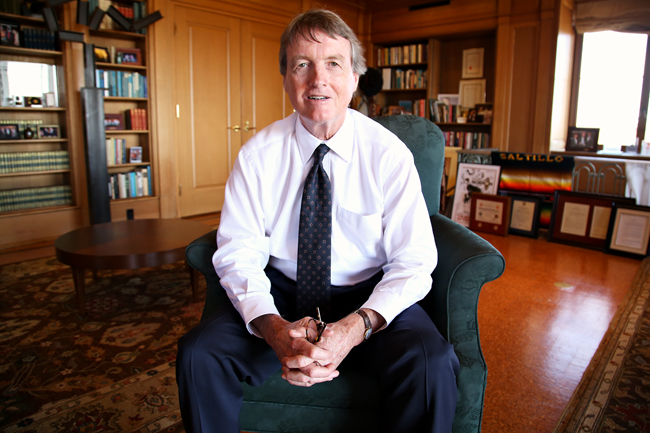The University’s four-year graduation rate has shown improvements over the last several years — but when President William Powers Jr. leaves office at the end of the school year, fewer than 70 percent of the students who started as freshmen in fall 2011 will be leaving with him.
In an interview with The Daily Texan, Powers acknowledged that he will leave office without watching a class achieve one of the central goals of his presidency — a 70 percent four-year graduation rate. Still, Powers said, the University is on its way to meeting such a goal.
“We’re not quite there yet, but we’re making tremendous progress,” Powers said.
The four-year graduation rate was 54.5 percent in fiscal year 2014, up from 40 percent in fiscal year 2000, according to a University accountability report.
Watch an interview with Powers as he discusses his tenure as president:
David Laude, senior vice provost for enrollment and graduation management, said when he was brought into the provost’s office, he was charged with improving the four-year graduation rate quickly.
“The class that was supposed to have this done by was the class of 2017,” Laude said. “That means the class that is currently finishing its sophomore year — two years from now — they need to be graduating not with a 50 percent graduation rate, but with a 70 percent [rate].”
Over the course of the last two years, the University introduced a number of initiatives aimed at increasing the four-year graduation rate. Laude gave a $3 million-grant to the Office of the Vice President of Student Affairs to hire mental health counselors in the University’s largest colleges, to reduce student stress, and launched a four-year graduation “help desk,” among other initiatives.
Last month, UT System Chancellor William McRaven said he was not satisfied with current four-year graduation rates at any of the UT System institutions.
“We have got to get our four-year graduation rates and our six-year graduation rates — we have got to improve those across all of our institutions,” McRaven said. “I’m not happy with where they are in a number of areas.”
Postponed graduation causes a negative ripple effect impacting student debt, among other factors, McRaven said.
“We are doing a disservice to the students, to the family of those students and, frankly, to the institution by not having better graduation rates,” McRaven said.
Powers said the root of the argument for increasing four-year graduation rates is that UT should do all it can to reduce the financial impact of higher education on students and families.
“There’s a lot of discussion and, rightly so, about affordability and the resources that a family has to devote to public higher education,” Powers said. “We’re sensitive to that.”
Powers said the dialogue on campus between students and the administration has changed in his years as president.
“I’m very proud of the fact that the initial response was, ‘Well, they’re telling us we’re not graduating on time,’ and now the attitude is, ‘We’re working together, helping each other toward a common goal,’” Powers said.
The class of 2017 is exhibiting the right signs for meeting the 70 percent graduation rate, Laude said.
“The class of 2017’s persistence rate at the end of their first year was 95 percent,” Laude said. “In other words, all but 5 percent came back and started their sophomore year, and that is the largest rate in the university’s history.”
The improvements stem in part from a changing campus mindset, according to Laude.
“A lot of the reason for this improvement has to do with things like really getting everybody to buy into the idea of trying to make it possible to graduate in four years,” Laude said. “There’s lots of community building.”


















